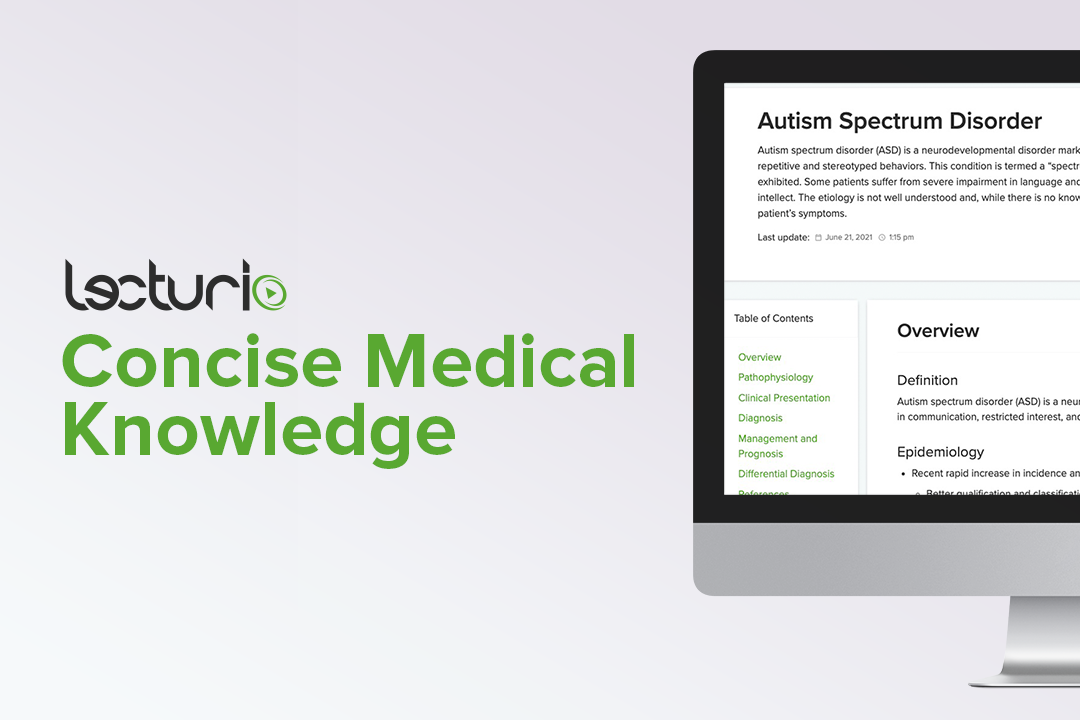Playlist
Show Playlist
Hide Playlist
Vaccine-Autism-Connection and Clinical Diagnosis
-
Slides Autism Pediatrics.pdf
-
Download Lecture Overview
00:01 I’d like to spend a little bit of time just briefly explaining the vaccine-autism connection. 00:07 There is none. 00:08 There is no connection between vaccine and autism. 00:11 This has been studied so carefully. 00:14 This arose largely because a British physician, Andrew Wakefield, took advantage of a connection between vaccines and autism that is purely time-based. 00:26 Think about this carefully. 00:28 If a child is going to present with autism as an inability to play with other children, that will probably show up when a child is put into a situation where there are other children more often. 00:39 An example would be daycare. 00:41 Many children in the United States start daycare around a year of age. 00:46 That’s also when they get their MMR vaccine. 00:49 Likewise, many children will start more social interactions when they enter school. 00:56 And it may be, especially, for the milder cases, that these children are picked up when they start school around the age of 6. 01:03 That’s also when they receive a second of the MMR vaccine. 01:08 So this temporal connection lead a doctor in England to think that there would be a great way to market a new vaccine and make some cash on the side by creating belief that vaccines are associated with autism. 01:22 Therefore, he created a fraudulent paper, which connected these two things. 01:27 And his goal was to create a vaccine that would be autism free. 01:32 Since then, this paper has been debunked. 01:35 He lost his license in England. 01:37 So it’s been well-known that this is no longer a connection. 01:42 But, if you imagine, if autism happens in 1 in 110 people and there is a myth out there that vaccines are connected to autism, people will start to come forward and say, “Yes, my child was diagnosed with autism right after they got the vaccine.” And this persisted through work of some celebrities. 02:00 And this connection has been hard to debunk resulting in remarkable outbreaks of very severe disease that wouldn’t need to happen if it weren’t for low vaccinations rates. 02:14 So we need to do our best to contraindicate and contradict the belief out there that vaccines and autism is connected. 02:23 We should not even entertain the thought that there is a connection here. 02:29 So let’s go back to autism. 02:31 There are some comorbidities that can present as a result of autism and other problems. 02:38 And you should be aware that these things can go together because we may treat such patients differently. 02:44 Patients with autism may or may not have intellectual disability. 02:48 But it’s more common among autistic patients. 02:51 Likewise, they may have language disorders, anxiety, depression, obsessive compulsive disorder, symptoms of attention deficit disorder or attention deficit hyperactivity disorder. 03:03 They may have self-injurious behavior or aggressive behavior. 03:07 They may develop seizures more often or tic disorders. 03:10 They also may develop food selectivity and that can cause all kinds of problems. 03:16 I once had a patient who would only eat peanut butter who presented with vitamin deficiencies. 03:21 We have to think very creatively about how to address these issues. 03:25 Also, they may have sleep difficulties or difficulties with sleep, which result in making their therapy harder. 03:33 So if we suspect autism, how do we make the diagnosis? I would encourage people to refer patients to an autism specialist. 03:42 These children really require expert care in terms of not only their evaluation but setting up a regimen of therapy. 03:50 There is genetic testing available for children with other sequelae such as fragile X or other problems. 03:56 And generally, an EEG is completely unhelpful, unless there are seizures present in which case you can identify a potential seizure disorder. 04:06 Treatment of autism can be very challenging. 04:10 And families can get very frustrated. 04:12 We have to have a lot of patience with these families because their lives are very difficult and challenged. 04:18 And they love their children and they want the best for them. 04:20 So we should try and help them find the best opportunities. 04:24 Generally, earlier special programs yield better results. 04:28 So the sooner you can make this diagnosis and intervene positively, the better the outcomes. 04:34 One study which I think was absolutely fascinating showed that for children who are in a standardized school, training the peers of that child to learn to integrate that child into the play was even more effective than training parents for how to get that chid to act better. 04:54 So it’s important in a child who’s having a difficult school situation to work with the school and even identify some potential peers for that child who can learn to interact better with that chid and that can go a long way for it’s integrating that child into the social structure of the school setting. 05:12 Additionally, there are some adjuvant medications that may be helpful. 05:17 SSRIs may help for mood or anxiety issues and stimulants may be helpful for attention deficit or attention deficit hyperactivity disorder. 05:28 Family therapy maybe key. 05:30 It’s important not only to get therapy for the child, but for the parents who struggle and may suffer significant depression as a result of having to deal with a child who is so difficult to manage. 05:43 The majority of patients have life-long symptoms. 05:47 Setting up a system for them to continue to work with them throughout their life is critically important. 05:53 So that’s my review of autism in children. 05:56 Thanks for your attention.
About the Lecture
The lecture Vaccine-Autism-Connection and Clinical Diagnosis by Brian Alverson, MD is from the course Child Development and Behavior. It contains the following chapters:
- Vaccine-Autism-Connection
- Clinical Diagnosis
Included Quiz Questions
Which of the following is NOT a co-morbidity of autism spectrum disorder?
- Eczema
- ADHD
- Malnutrition from food selectivity
- Sleep disorders
- Intellectual disability
Which of the following is TRUE regarding vaccinations and autism?
- There is no association of vaccination with autism.
- Autism is more common after the first dose of MMR.
- Autism is more common after the 2nd dose of MMR.
- Patients with a family history of autism should not be given MMR.
- Rule out autism in patients of 5 years before giving the 2nd dose of MMR.
Which of the following is NOT a co-morbidity of autism?
- Bruxism
- Tics disorder
- ADHD
- Aggressive behavior
- Depression and OCD
A mother brought her child in with a complaint of irritable behavior and poor school performance. She is suspecting autism. Which of the following would be your next step?
- Refer them to an autism specialist
- Start medical treatment of autism before confirmation
- Admit the child for observation
- Counsel the parents regarding the start of medical treatment immediately
- Evaluate the child after admitting him to the ER and plan an EEG
Which of the following is FALSE regarding the management of a patient with autism?
- SSRIs should be prescribed for ADHD management.
- Peer training
- Promote social interaction
- Special schools and programs
- Family therapy
Customer reviews
5,0 of 5 stars
| 5 Stars |
|
1 |
| 4 Stars |
|
0 |
| 3 Stars |
|
0 |
| 2 Stars |
|
0 |
| 1 Star |
|
0 |
Yo recomiendo este video, lastima no hay mas de TEA




